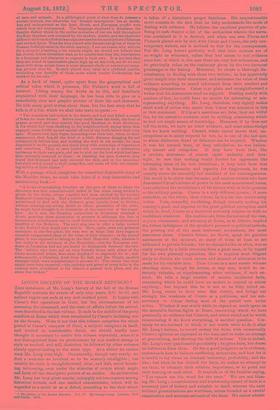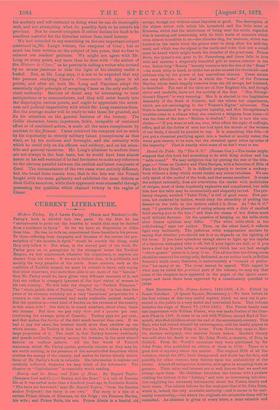LONG'S DECLINE OF THE ROMAN REPUBLIC.* Taus instalment of Mr.
Long's history of the fall of the Roman Republic narrates the events of only nine years, B.C. 58-50, and neither begins nor ends at any well marked point. It begins with Cassar's first operations in Gaul, but the circumstances of his assuming the command, and the state of affairs before his arrival, were described in the last volume. It ends in the middle of the party conflicts at Rome which were terminated by Caesar's declaring war on the Senate. Were it not that this volume comprises the whole period of Cassar'e conquest of Gaul, a subject complete in itself, and treated in considerable detail, we should hardly have thought it necessary to notice this volume separately, since it is not distinguished from its predecessors by any marked change in style or method, and will, doubtless, be followed by other volumes closely approximating to the same type. As a writer we cannot rank Mr. Long very high. Occasionally, though very rarely, we find a sentence so involved as to be scarcely intelligible ; but usually his style is straightforward, clear, and dull, never becom- ing interesting, even under the stimulus of events which might call forth all the descriptive powers of an author. As an historian Mr. Long has very great merits, unhappily not too common among historical writers, and one marked characteristic, which will be regarded as a merit or as a defect, according to the view which
'The Decline of 'the Roman Republic. Vol. IV. By George Long. London : Bell and Daldy. 1872. is taken of a historian's proper functions. His unquestionable merit consists in the fact that he fully understands the mode of dealing with evidence. He follows the excellent practice of pre- fixing to each chapter a list of the authorities whence the narra- tive contained in it is derived, and when one sees Florus and Plutarch placed side by side with Cassar and Cicero, the only con- temporary writers, one is inclined to fear for the consequences. But Mr. Long knows perfectly well that later authors are of no weight as witnesses, unless they bad access to real evidence since lost, of which in this case there are very few indications, and he practically relies on the testimony given by the two foremost personages in the history. Moreover, he shows a thorough dis- crimination in dealing with these two writers ; he has apparently great insight into their characters, and estimates the value of their evidence according to sound inferences from their conduct and varying circumstances. Caesar is so plain and straightforward a writer that his statements need no support. Dealing merely with matters of fact, he could have no motive for misstating or mis- representing anything. Mr. Long, therefore, very rightly makes short work of critics who assert that Caesar was mistaken in this or that statement. If Cassar's assertions are false, they are wilful lies, for his narrative contains next to nothing concerning which he had not ample means of knowledge. Moreover, if he does not tell the truth, we have no other evidence, and must acknowledge that we know nothing. Cassar's whole career shows that, un- scrupulous as in many respects he was, he is one of the last men to whom deliberate fraud or falseness can be imputed. Whether it was his natural bent, or deep calculation, he was habitu- ally sincere and outspoken. It may have been that, like a modern statesman of almost equal audacity and fore- sight, be saw that nothing would deceive his opponents like informing them of his real intentions ; it may have been that in this, as in humanity and capacity for forgiveness, he was morally above the miserably low standard of his contemporaries. The result is in either case the same, and modern writers who have denounced Caesar's seizure of power in the moat unmeasured terms, have admitted the truthfulness of his history with as little question as his military genius. Cicero is a very different person ; if more estimable, on the whole, than Caesar, he is a far less trustworthy writer. Vain, cowardly, vacillating, though honestly seeking his country's good, and superior to the gross political corruption amid which he lived, Cicero as a historical authority inspires us with no confidence whatever. His orations are, from the nature of the ease, exports statements; and advocacy at Rome, as at Athens, implied the fullest indulgence of the speaker's personal or political hatreds, the pouring out of the most irrelevant accusations, the most rancorous abuse. Cicero's letters, no doubt, speak his genuine sentiments at the moment, so many of them at least as are addressed to private friends ; but he changed sides so often, was so easily swayed by a little attention from a great man, or by regard for his own personal reputation, that it requires most diligent study to discern the exact nature and amount of allowance to be made for his variable bias. Thus Cicero is a most unsafe witness standing alone, though his letters, at any rate, would be ex- tremely valuable, as supplementing other evidence, if such ex- isted. He tells a large number of minute incidental facts, concerning which he could have no motive to conceal or colour anything ; but beyond this he is not to be fully relied on. Mr. Long seems to have seen this clearly, and brings out strongly the weakness of Cicero as a politician, and his sub- serviency to Caesar during most of the period now under notice. Whether it was worth while to expend so much space on the miserable faction-fights at Rome, concerning which we have practically no evidence but Cicero's, and which would not be worth remembering if we knew everything, is another question. Cer- tainly we are inclined to think it not worth while to do it after Mr. Long's fashion, to record merely the facts, with occasionally Cicero's opinions as expressed at the time, and to make no attempt at generalizing, and showing the drift of actions. This is, indeed, Mr. Long's very questionable peculiarity ; he gives fade, but draws no inferences from them. He has a good judgment as to evidence, understands how to balance conflicting statements, and how far it is lawful to lay stress on internal testimony, probability, and the like; but when he has elicited the facts, he makes no attempt to use them, to estimate their relative importance, or to point out their bearing on each other. It reminds us of the familiar saying, "You cannot see the wood for the trees." We are not blam- ing Mr. Long ; a conscientious and trustworthy record of facts is a necessary part of history and valuable in itself, whereas the most brilliant generalisations are worthless, unless founded on a careful examination and accurate estimate of the facts. We rather admire
his modesty and self-restraint in doing what he can do thoroughly well, and not attempting what he possibly feels to be outside his province. But he cannot complain if critics declare his book to be excellent material for the historian rather than itself history%
We had intended to say something on the one important subject contained in;Mr. Long's volume, the conquest of Gaul ; but so much has been written on the subject of late years, that we fear to exhaust our readers' patience. We might not agree with Mr. Long on every point, any more than he does with "the author of the Histotre de Cesar," as he persists in calling a writer who seemed by no means :desirous to hide the light of his identity under a bushel. But, as Mr. Long says, it is not to be expected that any two persons studying Cmar's Commentaries will agree in all points, and after all, both Mr. Long and Napoleon adopt the essentially right principle of accepting Cassar as the only and suffi- cient authority. Matters of detail may be interesting to local antiquarians or to commentators, and they will enter keenly into the disputes:on various points, and ought to appreciate the acute- ness and judicial impartiality with which Mr. Long examines them. But the average reader will be ready to take these for granted, and fix his attention on the general features of the history. The Gallic character, brave, impetuous, fickle, incapable of sustained effort or of combined action, is made all the more conspicuous by contrast to thejtoman. Cassar achieved his conquest not so much by his superiority in strictly military talent (conspicuous as that was), as by his coolness and foresight, and the certainty with which he could rely on his officers and soldiery, and on his scien- tific and general resources. Mr. Long's allusions to modern times are not always in the best taste, but he would have been almost heroic in his self-restraint if he had foreborne to make any reference to the obvious parallel between the earliest and latest conquests of Gaul. The circumstances of the two cases were entirely different, but the broad facts remain true, that in the late war the French fought with the same gallantry and exhibited the same defeats as their Gallic ancestors, while their opponents were successful through possessing the qualities which chained victory to the eagles of Omar.



































 Previous page
Previous page